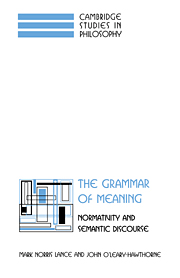
-
Select format
-
- Publisher:
- Cambridge University Press
- Publication date:
- December 2011
- December 1997
- ISBN:
- 9780511895838
- 9780521583008
- 9780521070300
- Dimensions:
- (216 x 138 mm)
- Weight & Pages:
- 0.65kg, 468 Pages
- Dimensions:
- (216 x 140 mm)
- Weight & Pages:
- 0.6kg, 468 Pages
You may already have access via personal or institutional login
Book description
What is the function of concepts pertaining to meaning in socio-linguistic practice? In this study, the authors argue that we can approach a satisfactory answer by displacing the standard picture of meaning talk as a sort of description with a picture that takes seriously the similarity between meaning talk and various types of normative injunction. In their discussion of this approach, they investigate the more general question of the nature of the normative, as well as a range of important topics specific to the philosophy of language.
Reviews
Review of the hardback:‘Lance and O’Leary-Hawthorne have a completely novel interpretation of and approach to the claim that the concept of meaning is a normative one. Meaning talk is not talk about something that is already there - not even linguistic norms that are already there. It is rather an attempt to bring something into existence - to ‘establish’ norms that will make possible mutual understanding and practical cooperation. This excellent study makes a signal contribution to our understanding of one of the most central and controversial topics in the philosophy of language.’
Bob Brandom - University of Pittsburgh
Review of the hardback:‘The Grammar of Meaning contains a lot of interesting philosophy. It ingeniously defends the radical claim that meaning-ascriptions do not have worldly truth-makers, but are more like endorsements or recommendations. And there is much more, including a subtle investigation of normativity itself.’
William G. Lycan - University of North Carolina
Contents
Metrics
Altmetric attention score
Full text views
Full text views help Loading metrics...
Loading metrics...
* Views captured on Cambridge Core between #date#. This data will be updated every 24 hours.
Usage data cannot currently be displayed.
Accessibility standard: Unknown
Why this information is here
This section outlines the accessibility features of this content - including support for screen readers, full keyboard navigation and high-contrast display options. This may not be relevant for you.
Accessibility Information
Accessibility compliance for the PDF of this book is currently unknown and may be updated in the future.


